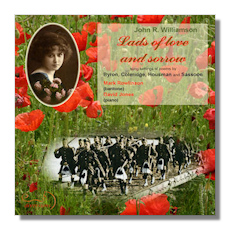
The Internet's Premier Classical Music Source
Related Links
- Latest Reviews
- More Reviews
-
By Composer
-
Collections
DVD & Blu-ray
Books
Concert Reviews
Articles/Interviews
Software
Audio
Search Amazon
Recommended Links
Site News
 CD Review
CD Review
John Ramsden Williamson

Lads of Love and Sorrow
Settings of Poems by
Byron, Coleridge, Housman & Sassoon
- She walks in beauty
- She is not fair
- When we two parted
- Before the battle
- I stood with the dead
- Hughley Steeple
- I lay me down and slumber
- Sinner's rue
- Parta Quies
- He looked at me with eyes I thought
- Others, I am not the first
- Farewell to barn and stack and tree
- When the lad for longing sighs
- I hoed and trenched and weeded
- Oh were he and I together
- The new mistress
- Oh, see how thick the gold cup flowers
- Easter Hymn
- Revolution
- In valleys of springs of flowers
- March
Mark Rowlinson, baritone
David Jones, piano
Divine Art Diversions DVV24153 67min
John Ramsden Williamson was born in Manchester in 1929. His education at William Hulme's Grammar School and two years of National Service were followed by a period of study at the Royal Manchester College of Music, where he studied Piano and Composition. After gaining several degrees, he embarked on a career in teaching at a variety of schools in England and Wales between 1952 and 1992. His unflinching dedication to composition has helped him develop his own individual style through palindromic techniques of rhythm, harmony and melody, combined with modal and pentatonic characteristics.
He has a special predilection for English Songs based on Housman's poetry, and this issue is indeed dominated by settings of poems by this quite intriguing writer. Of the 25 pieces, only 5 are not Housman's. Williamson's settings are lyrical, romantic and passionate as befits the texts, and all are very worthy additions to the repertoire of modern English song. The programme can be divided into three distinct sections. The Three Romantic Songs by Byron and Coleridge are the composer's first efforts in the genre and were written after his student days in the early 50's when he was still under the spell of the romantic style. 20 years had to pass for Williamson to return to the song medium. After reading by chance A.E. Housman's poetry, he was completely bowled over, finding in it a self-identification that totally absorbed him.
The diverse range of themes and emotional contrasts that these works possess (tragedy, sorrow, death), not to mention the pastoral and ironic nature of some, have constantly attracted the composer to keep setting them to music, and to date, some 120 of them have taken this particular artistic garb. The two Sassoon World War I poems conclude this significant collation; two pieces that mean a lot to the composer in that they represent one of the occasions when he was chosen as one of the winners of the English Poetry and Song Society poetry setting competitions.
Baritone Mark Rowlinson, sympathetically supported by pianist David Jones, sings with meticulous and exquisite delicacy, always highlighting the inner spirit of each poem with superb artistic ability. First-rate sound and notes complete a truly fine addition to the English Song Canon. Recommended.
Copyright © 2011, Gerald Fenech




















